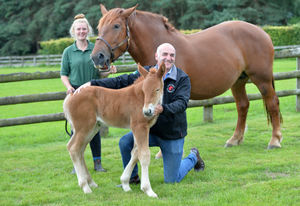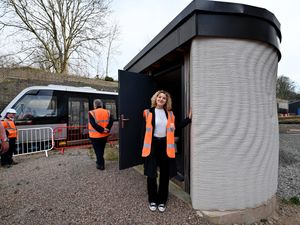WATCH: New hope for rare breeds as a healthy filly foal is born using pioneering technology
The future is looking bright for a rare horse breed after innovative technology was used to determine the sex of a foal born in Shropshire.

It is hoped that pioneering technology at Stallion AI Services in Whitchurch, a UK based centre of excellence for equine reproduction, will secure the survival of the rare Suffolk Punch horse, by ensuring new foals are born female to allow for reproduction.
There are fewer than 72 female Suffolk Punches remaining in the UK and fewer than 300 in the world, so the team at Stallion AI Services are keen to ensure the survival of this iconic British horse.
Tullis Matson, owner and managing director of Stallion AI Services, saw an opportunity to use a new technological advancement in the sex sorting of equine semen and help progress the breed.
"The Suffolk Punch horse is a heavy horse, like the plough horses used years ago," he said. "There is not so much use for them now and they are disappearing. It is a shame to lose a part of our heritage in this way.
"The success of any species is dependent on how many females there are. Overall, there was about 35 foals born last year but they always tend to be male heavy and we want to change that.
"Three or four more females born a year can make all the difference to saving this breed on the brink of extinction."
Exciting
The recent foal was born from a mare owned by Nottingham Trent University and a stallion from Mike Clarke of Holbeache Farm, Suffolk. Mr Matson said it was so exciting being part of such a big project between many different parties.
"Normally, we can get the foal sexed at 60 days but we had to wait 11 months to find out if it was definitely going to be a female," he said. "There is always a five per cent chance it will be a boy. When it popped out it was such a relief. And to see to foal galloping around the field is so emotional.
"To be able to use our reproduction expertise in this way, to help preserve an irreplaceable part of our magnificent heavy horse heritage is something we have been working towards for many years.
"The challenges have been great and many but watching the birth of this beautiful, healthy filly foal was a truly magical experience."
Christopher Price, chief executive of the Rare Breed Survival Trust, said: “This is tremendous news for anyone concerned with the conservation of our native equines. The most effective way of increasing the population size of this very rare breed is by increasing the number of fillies being born.
“The project demonstrates the viability of using new techniques for selecting female foals in order to increase the breeding population much more rapidly than could be achieved through relying on traditional methods. We hope it will prove to be a model for more projects in the future.”





